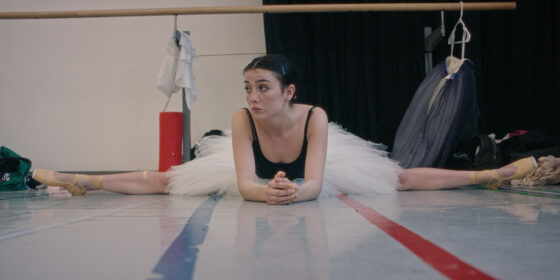TIFF 2023 | Swan Song (Chelsea McMullan, Canada) — Special Presentation

By Gabrielle Marceau
It seems every ballet documentary has to have an image of feet. Usually bloody and bandaged, pulled gingerly out of a pointe shoe, the dancer’s mangled foot betrays the agony required of the art, but also reveals our desire for confirmation that ethereal beauty has a price in pain. Chelsea McMullan’s Swan Song—which documents the process behind the National Ballet’s 2022 production of Swan Lake—doesn’t include such a shot, but is still enamoured with the dancer’s sacrifice and suffering. There is the principal dancer, Jurgita Dronina, who wears a neck brace during rehearsals to manage a nerve injury, or the punkish corps-de-ballet dancer Shaelyn Estrada, who is candid about the jealousy, depression, and burnout of a dancer’s life (she describes ballet as her salvation and her demon).
Her rawness is matched in sangfroid by Karen Kain, the former ballerina and artistic director of the National Ballet who has put off her retirement to direct Swan Lake. McMullan gives Kain her due as a Canadian icon (one interviewee describes her as Canada’s Princess Diana) and the gracious, stalwart shepherd of Canadian dance. But the documentary as a whole has the strange effect of suggesting an organization, and a leader, at a crossroads, without showing much conflict. The crux of the film is a decision by Kain to eschew the traditional pale pink tights—a symbol for ballet’s racial bias and aesthetic rigidity—in favour of bare legs. The decision isn’t well received by all dancers, including Shaelyn. who’s concerned that the self-harm scars on her thighs will be distracting, but has no real institutional opposition. The film seems poised before a revelation—at one point, Kain mentions the decision to set and costume designer, Gabriela Tylesova, but says she won’t talk about it in front of the camera—but it’s unclear if McMullan couldn’t get the inside scoop or there wasn’t one to get.
As a portrait of the arduous task of making art, Swan Song delivers on the stress and strain of the process but also the power of the payoff: a montage of the completed ballet is truly rousing, a visceral argument for the potency of ballet itself. McMullan may not have set out to make an effective piece of PR for the National Ballet, but as a portrait of an institution trying to meet its era (namely, the scrutiny of racial and gender dynamics post-George Floyd and #metoo), Swan Song feels like it’s come after the reckoning when the careful responses have been drafted and the only discomfort on display is the dancer’s.
Gabrielle Marceau

